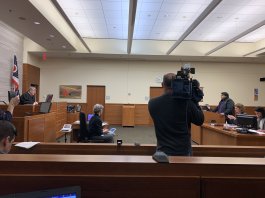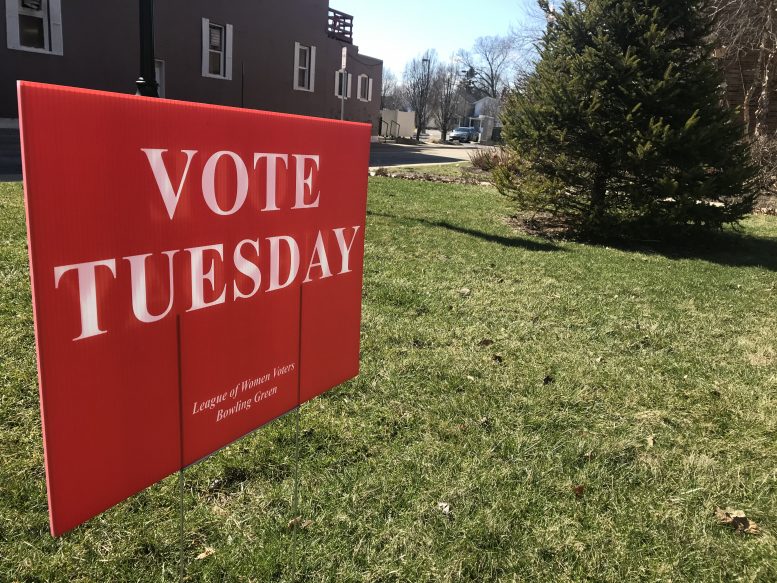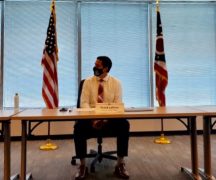Ohio Capital Journal
The dust is beginning to settle following a dizzying Monday that saw the Primary Election dragged through a press conference, challenged in court and ultimately postponed through an emergency health declaration.
The election did not happen Tuesday as planned. Gov. Mike DeWine and Ohio Secretary of State Frank LaRose, heralded for their earlier decisions amid the COVID-19 health crisis, are now facing growing scrutiny as the election plans remain in doubt.
The gloves have come off. The rift between Ohio’s executive branch and state legislature is starting to become evident, with the House Minority Leader Emilia Strong Sykes, D-Akron, accusing LaRose of lying to Ohioans. Here is where we stand as of early Tuesday evening:
It’s unclear how the election will move forward.
Early votes and absentee ballots were cast over the preceding weeks, but the decision was made to postpone Tuesday’s in-person voting.
The DeWine-LaRose plan calls for reopening the absentee (mail-in) ballot application process. Ohioans would then have several months to apply and cast absentee ballots through early June. The actual Election Day would take place Tuesday, June 2.
However, the power does not rest in their hands.
Neither the governor nor the secretary of state has unilateral power to change an election date, which is set by the Ohio General Assembly. This is why DeWine and LaRose had to rely on a health emergency declared by Ohio Department of Health Director Amy Acton on Monday evening in order to postpone the election.
Troubling matters is that both legislative chambers are off this week due to the virus. Committee hearings were postponed and chamber-wide sessions were put on hold until later in the month. Legislative staffers are primarily working from home.

Legislators on both sides, including Sykes as the House Minority Leader, have urged the Ohio General Assembly to take action and figure out a new plan for the election.
“We stand ready to answer that call and come back to work,” Sykes said in a provided statement. “I strongly urge the Speaker and the Senate President to call the legislature back into session immediately.”
The Ohio Senate is not scheduled to host another session until March 25, and there is no indication to this point Senate President Larry Obhof, R-Medina, will convene an emergency session. Likewise, the Ohio House of Representatives is not planning to meet the rest of this week.
LaRose putting the cart before the horse?
LaRose is not waiting for the General Assembly to make a determination. He has already issued a directive to the 88 county boards of election announcing that the primary “is suspended until June 2, 2020.”
LaRose instructed the counties to follow new guidelines for extended absentee voting and a new Election Day in June. However, he is prohibiting the offices from processing any new voter registrations. Those who were not eligible to vote on March 17 will apparently not be able to register in time for the June 2 election, according to LaRose’s directive.
Sykes takes issue with LaRose directive.
Sykes offered strong words for LaRose’s decision to send out that directive. In a news release from Monday afternoon, Sykes said the secretary of state “is creating more chaos with (a) misinformation campaign.”
“This is just wrong,” Sykes said. “As the governor has noted, and state law requires, only the legislature or the court has the power to set or change the election date and thus far, neither entity has done that. Yet LaRose continues to suggest people can continue to vote absentee in direct violation of state law. This too is wrong.”

The Ohio Democrats are taking legal action.
Ohio Democratic Party Chairman David Pepper had argued Monday morning that the legislature should act to determine a new elections plan.
“The most appropriate and lawful way to resolve this situation is for the Ohio General Assembly to act,” he said in a statement at 11 a.m., “to use their legislative power and update Ohio’s election statues to address this emergency situation.”
Once it became clear the legislature would not act on Tuesday, Pepper announced the party was taking its own legal action with the Ohio Supreme Court.
“(A)uthority for a new election must come from the legislature or from a court,” he said in a statement. “Today’s action seeks that court order, preserving the primary while also proposing a more workable window for the election to take place, along with multiple opportunities and a reasonable amount of time for voters to vote.”
Views on the decision to postpone the election are split.
There has been a wide range of viewpoints regarding a Franklin County judge’s decision to reject an election postponement, and the subsequent decision by Acton to postpone voting through a health emergency.
Many agreed with the decision to push the election back, citing public health needs, but say these voting issues demonstrate a need for reform.
“While we are disappointed in the chaotic process that we saw unfold over the last few days, we do agree with the outcome: it is not safe or practical to hold the primary election (Tuesday),” said League of Women Voters of Ohio Director Jen Miller. “In addition to supporting voters and poll workers during this primary, we will be advocating for changes to Ohio’s absentee ballot process and other election reforms.”
Others believe the state government should have accepted the judge’s ruling and held the election after all. This includes DeWine’s opponent from the 2018 gubernatorial race, Democrat Richard Cordray.
Cordray wrote on Twitter: “Judge Frye is right that halting the Ohio primary at the last minute sets ‘a terrible precedent’ and the coming weeks offer no clear alternative, which is why Florida, Arizona, and Illinois are going ahead with their primaries (Tuesday). We should all respect the court ruling.”
Melissa Ackison, a controversial Republican candidate for the State Senate, accused DeWine of trying to rig the election.
“Give the Republicans authority and this is what you get,” she wrote. “I’ve never been more disgusted with my own party in my life.”

House Majority Whip Jay Edwards, R-Nelsonville, was unflinching in his own criticism of the decision to push back the election.
“This has been extremely unfair to the people of Ohio,” he wrote on Facebook. “Maybe this election should have been called off. However, that should’ve been done last week, not hours before the polls were set to open. Especially considering the legislature is supposed to control these powers. Having an election (Tuesday) MAY have been dangerous for Ohioans, but the precedent this is setting by allowing the Executive Branch to overstep their power is far more dangerous for the future of our great state.”
DeWine and LaRose released a joint statement on Tuesday evening regarding these reactions and the legal filing from earlier in the day. It reads, in full:
“Last night, the actions taken by Ohio Department of Health Director Dr. Amy Acton saved Ohio lives. By preventing Ohioans from going to polling locations, we averted a situation which would have gone against the most recent scientific evidence available and could have dangerously advanced the spread of coronavirus across Ohio. It is abundantly clear that it would have been impossible to carry out a fair, accessible, and safe election today. As we move forward, it is vitally important that Ohioans have a significant period of time to cast mail-in absentee ballots and an opportunity to vote in-person, as was provided in the directive issued last night by the Secretary of State.”
***





